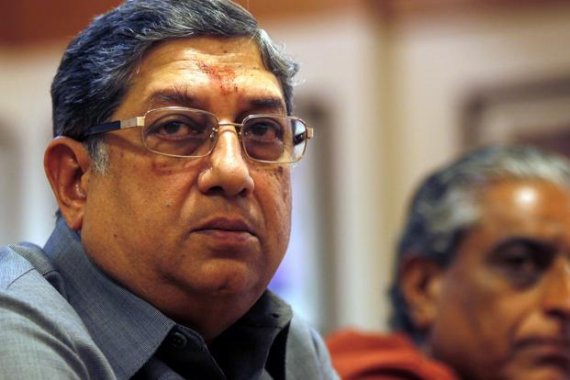New Delhi: The Supreme Court Tuesday asked the BCCI to disclose the effect on the IPL and Champions League Twenty20 cricket tournaments if its president N. Srinivasan doesn't own the Chennai Super Kings (CSK) franchise.
"What would be the effect on the Indian Premier League and Champions League if your president does not own a team? If he goes, will it lead to collapse of the project," the apex court bench of Justice T.S. Thakur and Justice Fakkir Mohamed Ibrahim Kalifulla asked as the apex cricketing body told the court that having commercial interest in IPL were distinct from the conflict of interest issue.
Senior counsel C.A. Sundaram told the court that except for Srinivasan, no other administrator owns a team or has commercial interest in the IPL.
The court sought the list of the people who would be affected if it was to strike down the Board of Control for Cricket in India rules that permitted its members from having commercial interest in the IPL and the Champions League.
The court's poser to BCCI came in the course of the hearing of the plea by the Cricket Association of Bihar which has challenged a Sep 27, 2008, amendment to its rule 6.2.4 permitting its office bearers, administrator, players and others to have commercial interest in the IPL.
Sundaram, who appeared for the BCCI, told the court that there was no embargo on being an office bearer of the apex cricketing body and having interest in the IPL. He said that the conflict of interest issue arises when two interests clash.
"There is no embargo in having interest in two things but conflict of interest arises when two interests clash," Sundaram told the court.
"What kind of contract you have entered with whom. Which of these contractors will suffer if rule 6.2.4 goes," the court asked seeking the list of such people who were the beneficiaries of the 2008 amendment to the rule prohibiting conflict of interest in the cricketing body.
"Millions of people view this game on the assumption that the game is fair. The 'fair' is the public function and if you falter on that, then you are accountable," the court told Sundaram, asking him: "Can you have a person who has commercial interest and then also judge on the conflict of interest issue."
Opposing the plea challenging the carving of exception to rule prohibiting conflict of interest, Sundaram took the court to the origin of the issue leading to setting up of a committee that suggested the carving out the exceptions that were incorporated in 2008.
Admitting that the BCCI performed certain functions which were in the nature of public duties and some of them were open to judicial review, Sundaram sought to impress upon the court that the cricketing body's internal functioning could not be interfered with unless it conflicted with statutory provisions it was founded on -- the Tamil Nadu Societies Registration Act, 1975.
"Your rules may be sacrosanct for you, not for us. Unless you are able to satisfy us that the conflict of interest is justified in law on the basis of public policy, limiting the jurisdiction of the court to private parties you are not headed anywhere," the court told Sundaram.
Having said this, the court further said: "You must realise the scope of jurisdiction we are exercising. This is being exercised not to promote you or another person's cause. It is to promote the purity of the game. If you want 6.2.4 to justify your stance, please satisfy us. What will happen if an administrator will not own a team? Heavens will not fall."
Earlier, lawyer Rahul Mehra, appearing for a former Ranji Trophy player, told the court that the 2013 IPL betting scandal was not the first to rock cricket in the country. Before it, in 2000, the Hansie Cronje betting scandal rocked Indian cricket and the matter was investigated by the Central Bureau of Investigation (CBI) and nothing came out of it except that former skipper Mohammad Azharuddin and Ajay Jadeja were placed under life ban.
Telling the court that such exposes are invariably buried quietly, Mehra told the court that if it happens once, then BCCI may be justified of ignorance but when it happens repeatedly then there is a complacence towards such things on the part of BCCI.
Alleging that conflict of interest travels not only through administrators, players and legislators, Mehra said: "This has been happening earlier also, they were aware and did nothing to curb or prevent it."
Describing the 2008 amendment to the BCCI rules, carving exception to the conflict of interest rule in respect of the IPL and Champions League, as a "disguised backdoor entry", senior counsel Rajeev Dhavan, appearing for former BCCI president I.S. Bindra told the court that the purpose of the game is not commercial.
He said the criminality aspect of what has emerged from the Mudgal Committee report should be examined by a Special Investigation Team, and the issue of disciplinary proceedings for wrong-doings within the BCCI would require an external mechanism to deal with and report to the court.
The hearing would continue Wednesday.

